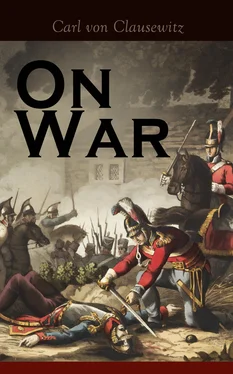But now we come upon a peculiar means of influencing the probability of the result without destroying the enemy’s Army, namely, upon the expeditions which have a direct connection with political views. If there are any enterprises which are particularly likely to break up the enemy’s alliances or make them inoperative, to gain new alliances for ourselves, to raise political powers in our own favour, &c. &c., then it is easy to conceive how much these may increase the probability of success, and become a shorter way towards our object than the routing of the enemy’s forces.
The second question is how to act upon the enemy’s expenditure in strength, that is, to raise the price of success.
The enemy’s outlay in strength lies in the wear and tear of his forces, consequently in the destruction of them on our part, and in the loss of provinces , consequently the conquest of them by us.
Here, again, on account of the various significations of these means, so likewise it will be found that neither of them will be identical in its signification in all cases if the objects are different. The smallness in general of this difference must not cause us perplexity, for in reality the weakest motives, the finest shades of difference, often decide in favour of this or that method of applying force. Our only business here is to show that, certain conditions being supposed, the possibility of attaining our purpose in different ways is no contradiction, absurdity, nor even error.
Besides these two means, there are three other peculiar ways of directly increasing the waste of the enemy’s force. The first is invasion , that is the occupation of the enemy’s territory, not with a view to keeping it , but in order to levy contributions upon it, or to devastate it.
The immediate object here is neither the conquest of the enemy’s territory nor the defeat of his armed force, but merely to do him damage in a general way . The second way is to select for the object of our enterprises those points at which we can do the enemy most harm. Nothing is easier to conceive than two different directions in which our force may be employed, the first of which is to be preferred if our object is to defeat the enemy’s Army, while the other is more advantageous if the defeat of the enemy is out of the question. According to the usual mode of speaking, we should say that the first is primarily military, the other more political. But if we take our view from the highest point, both are equally military, and neither the one nor the other can be eligible unless it suits the circumstances of the case. The third, by far the most important, from the great number of cases which it embraces, is the wearing out of the enemy. We choose this expression not only to explain our meaning in few words, but because it represents the thing exactly, and is not so figurative as may at first appear. The idea of wearing out in a struggle amounts in practice to a gradual exhaustion of the physical powers and of the will by the long continuance of exertion .
Now, if we want to overcome the enemy by the duration of the contest, we must content ourselves with as small objects as possible, for it is in the nature of the thing that a great end requires a greater expenditure of force than a small one; but the smallest object that we can propose to ourselves is simple passive resistance, that is a combat without any positive view. In this way, therefore, our means attain their greatest relative value, and therefore the result is best secured. How far now can this negative mode of proceeding be carried? Plainly not to absolute passivity, for mere endurance would not be fighting; and the defensive is an activity by which so much of the enemy’s power must be destroyed that he must give up his object. That alone is what we aim at in each single act, and therein consists the negative nature of our object.
No doubt this negative object in its single act is not so effective as the positive object in the same direction would be, supposing it successful; but there is this difference in its favour, that it succeeds more easily than the positive, and therefore it holds out greater certainty of success; what is wanting in the efficacy of its single act must be gained through time, that is, through the duration of the contest, and therefore this negative intention, which constitutes the principle of the pure defensive, is also the natural means of overcoming the enemy by the duration of the combat, that is of wearing him out.
Here lies the origin of that difference of Offensive and Defensive , the influence of which prevails throughout the whole province of War. We cannot at present pursue this subject further than to observe that from this negative intention are to be deduced all the advantages and all the stronger forms of combat which are on the side of the Defensive , and in which that philosophical-dynamic law which exists between the greatness and the certainty of success is realised. We shall resume the consideration of all this hereafter.
If then the negative purpose, that is the concentration of all the means into a state of pure resistance, affords a superiority in the contest, and if this advantage is sufficient to balance whatever superiority in numbers the adversary may have, then the mere duration of the contest will suffice gradually to bring the loss of force on the part of the adversary to a point at which the political object can no longer be an equivalent, a point at which, therefore, he must give up the contest. We see then that this class of means, the wearing out of the enemy, includes the great number of cases in which the weaker resists the stronger.
Frederick the Great, during the Seven Years’ War, was never strong enough to overthrow the Austrian monarchy; and if he had tried to do so after the fashion of Charles the Twelfth, he would inevitably have had to succumb himself. But after his skilful application of the system of husbanding his resources had shown the powers allied against him, through a seven years’ struggle, that the actual expenditure of strength far exceeded what they had at first anticipated, they made peace.
We see then that there are many ways to one’s object in War; that the complete subjugation of the enemy is not essential in every case; that the destruction of the enemy’s military force, the conquest of the enemy’s provinces, the mere occupation of them, the mere invasion of them—enterprises which are aimed directly at political objects—lastly, a passive expectation of the enemy’s blow, are all means which, each in itself, may be used to force the enemy’s will according as the peculiar circumstances of the case lead us to expect more from the one or the other. We could still add to these a whole category of shorter methods of gaining the end, which might be called arguments ad hominem. What branch of human affairs is there in which these sparks of individual spirit have not made their appearance, surmounting all formal considerations? And least of all can they fail to appear in War, where the personal character of the combatants plays such an important part, both in the cabinet and in the field. We limit ourselves to pointing this out, as it would be pedantry to attempt to reduce such influences into classes. Including these, we may say that the number of possible ways of reaching the object rises to infinity.
To avoid under-estimating these different short roads to one’s purpose, either estimating them only as rare exceptions, or holding the difference which they cause in the conduct of War as insignificant, we must bear in mind the diversity of political objects which may cause a War—measure at a glance the distance which there is between a death struggle for political existence and a War which a forced or tottering alliance makes a matter of disagreeable duty. Between the two innumerable gradations occur in practice. If we reject one of these gradations in theory, we might with equal right reject the whole, which would be tantamount to shutting the real world completely out of sight.
Читать дальше












